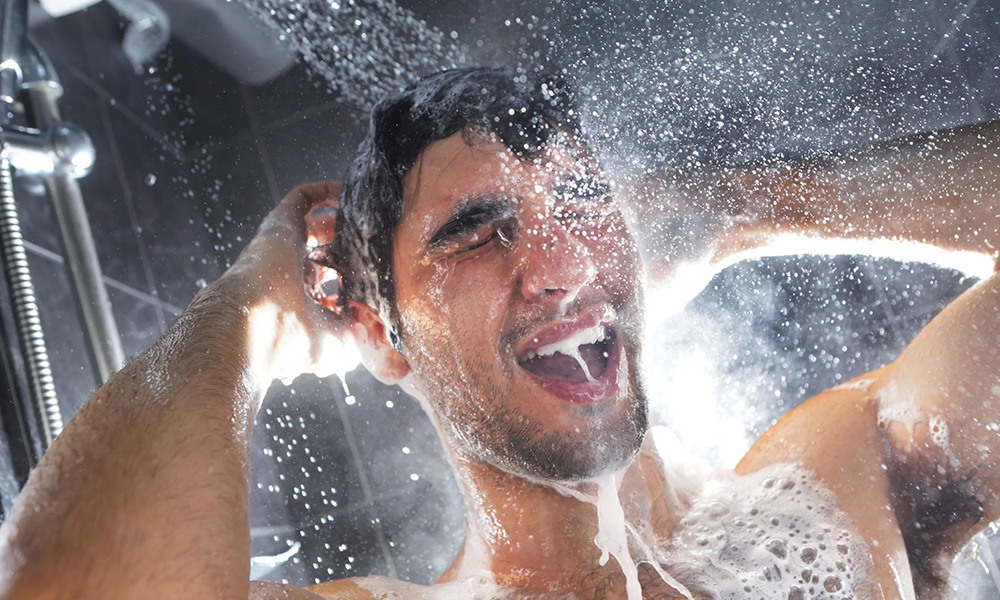
阿美莉卡·費(fèi)雷拉幾天都沒(méi)洗澡了。阿爾·羅克爾每天洗兩次。克里斯滕·貝爾與達(dá)克斯·西帕德要到孩子們“發(fā)臭”之后才給孩子們洗澡。不管你怎么看,我自己每天洗一次。
洗澡頻率會(huì)經(jīng)常性地成為人們的爭(zhēng)論焦點(diǎn),但似乎很難有一個(gè)定論,因?yàn)檫@是個(gè)人的私事。
我就是跟瑪格特一樣,怎么了??????不好意思,為什么你們會(huì)反對(duì)洗澡?
—安娜達(dá)(@scarberlain) 2023年7月20日
哈佛醫(yī)學(xué)院(Harvard Medical School)的數(shù)據(jù)顯示,洗澡頻率跟筆者一樣的人不少,約三分之二的美國(guó)民眾每天一次,但洗澡時(shí)間各有不同。對(duì)于每天洗澡的人來(lái)說(shuō),洗澡是必要的,有的是因?yàn)樵玳g運(yùn)動(dòng),有的是因?yàn)橐惶斓墓ぷ鲹]汗如雨,有的則是因?yàn)轶w味,更何況我還有個(gè)新發(fā)現(xiàn)的愛(ài)好:早上迅速?zèng)_一個(gè)冷水澡能夠讓我一天精神抖擻。不過(guò),我們洗澡的頻率到底應(yīng)該是多少?
不幸的是,與健康一樣,答案并非是統(tǒng)一的。
就像往常遇到皮膚相關(guān)問(wèn)題時(shí)一樣,我今早發(fā)短信咨詢了一位熟悉的皮膚科醫(yī)生馬克·阿卜杜勒馬利克博士,并詢問(wèn)了這個(gè)問(wèn)題。他是我的堂弟,位于費(fèi)城。他最初的回答是“洗的多并不一定就更好。”其他專家也同意這個(gè)看法。
頻繁洗澡可能會(huì)破壞他所稱的皮膚屏障,導(dǎo)致皮膚干燥、瘙癢、發(fā)炎。一開(kāi)始可能只是一小塊皮膚出問(wèn)題,但如果是洗澡時(shí)間長(zhǎng),水溫過(guò)高,就容易大面積爆發(fā)。
此外,根據(jù)哈佛醫(yī)學(xué)院的說(shuō)法,皮膚上還有一層有益菌保護(hù)膜。
哈佛醫(yī)學(xué)院的貼文稱:“我們的免疫系統(tǒng)需要常見(jiàn)微生物、灰塵和其他環(huán)境暴露給與一定的刺激,才能產(chǎn)生保護(hù)性抗體和‘免疫記憶’。一生當(dāng)中頻繁的洗澡可能會(huì)降低免疫系統(tǒng)的履職能力。”
另一方面,洗澡頻率過(guò)低會(huì)導(dǎo)致身體產(chǎn)生異味,會(huì)讓配偶、同事或百貨店中你身旁的陌生人感到不悅,我們應(yīng)避免這種情況的發(fā)生。克利夫蘭醫(yī)學(xué)中心(Cleveland Clinic)表示,洗澡頻率低產(chǎn)生的灰塵堆積也可能會(huì)影響皮膚屏障,導(dǎo)致毛孔堵塞、痤瘡、頭皮屑和濕疹。
那么我們又回到了“金發(fā)姑娘”問(wèn)題。既不能洗的太頻,又不能洗的太少,那什么樣的頻率才算適當(dāng)?
阿卜杜勒馬利克說(shuō):“皮膚在身體內(nèi)部和外部世界之間架起了一道屏障。只要洗澡不至于到影響皮膚屏障的完整性,那么就沒(méi)什么問(wèn)題。”
那么什么樣的頻率是才算適當(dāng)?
專家們一般建議每周有那么幾天洗澡就可以。
具體數(shù)字取決于個(gè)人,但了解自身身體和習(xí)慣是關(guān)鍵。每天洗澡對(duì)身體沒(méi)有不良影響(萬(wàn)歲!),每隔一天甚至一周洗兩三次也無(wú)妨。
如果你干的是體力活,而且皮膚會(huì)接觸汗水、灰塵和外部世界,那么每天洗澡更有利于保護(hù)自身的皮膚屏障健康。如果你沒(méi)有每天洗澡的習(xí)慣,那么減少洗澡頻率,例如一周兩三次,則更為合理。
關(guān)鍵在于如何洗澡。
洗澡方式最為重要
美國(guó)皮膚病學(xué)會(huì)(American Academy of Dermatology Association)建議,洗澡時(shí)間應(yīng)控制在五分鐘以內(nèi)(浴室歌手和思想家別怨我)。而且,與全身擦拭相反的是,我們實(shí)際上無(wú)需清洗身體全身每一寸肌膚。最重要的一點(diǎn)在于著重清洗腹股溝、腳部和腋窩。
另一個(gè)需要注意的事項(xiàng)是,不要暴力清洗,而且不要使用“絲瓜絡(luò)、泡芙和搓澡巾”,因?yàn)檫@些工具可能會(huì)刺激皮膚,并導(dǎo)致牛皮鮮爆發(fā)(要和我弟弟最愛(ài)的濃香型沐浴露說(shuō)再見(jiàn)了)。
頭發(fā)也不一定得每天都洗,取決于個(gè)人的發(fā)質(zhì)。如果頭發(fā)出油多,那么洗頭頻率應(yīng)該高于干燥或粗糙發(fā)質(zhì)。我的頭發(fā)很卷,然而直到我另一個(gè)與我有著同樣發(fā)質(zhì)的侄子建議我一周只洗一次或兩次頭之后,我才發(fā)現(xiàn)兩者之間存在的巨大差異,更何況此舉也讓我節(jié)省了大量的洗護(hù)產(chǎn)品購(gòu)買費(fèi)用。
如果我每天都需要洗澡一次以上怎么辦?
如果你喜歡早上洗澡,但在一天工作或晚上健身之后出了不少汗,洗兩次澡不一定就有壞處。
如果你每天洗兩次澡,則應(yīng)縮短洗澡時(shí)間,降低水溫,并在洗澡之后注意保濕。我的侄子提醒我說(shuō),一天之內(nèi)沒(méi)必要使用沐浴產(chǎn)品兩次。
第二次洗澡的目的應(yīng)該是洗去灰塵或汗水,或降低皮膚溫度。
以下是洗澡和保護(hù)皮膚的四大竅門:
縮短洗澡時(shí)間
將洗澡時(shí)間控制在3-5分鐘會(huì)降低皮膚干燥風(fēng)險(xiǎn)。
洗溫水澡或冷水澡
水溫過(guò)高會(huì)刺激皮膚。不妨轉(zhuǎn)動(dòng)控溫把手,洗個(gè)溫水或冷水澡。
使用不會(huì)使皮膚干燥的香皂。
使用較為溫和的肥皂,打肥皂時(shí)不要太用力。
保濕
在洗澡后涂抹潤(rùn)膚品,恢復(fù)皮膚水分。(財(cái)富中文網(wǎng))
譯者:馮豐
審校:夏林
阿美莉卡·費(fèi)雷拉幾天都沒(méi)洗澡了。阿爾·羅克爾每天洗兩次。克里斯滕·貝爾與達(dá)克斯·西帕德要到孩子們“發(fā)臭”之后才給孩子們洗澡。不管你怎么看,我自己每天洗一次。
洗澡頻率會(huì)經(jīng)常性地成為人們的爭(zhēng)論焦點(diǎn),但似乎很難有一個(gè)定論,因?yàn)檫@是個(gè)人的私事。
我就是跟瑪格特一樣,怎么了??????不好意思,為什么你們會(huì)反對(duì)洗澡?
—安娜達(dá)(@scarberlain) 2023年7月20日
哈佛醫(yī)學(xué)院(Harvard Medical School)的數(shù)據(jù)顯示,洗澡頻率跟筆者一樣的人不少,約三分之二的美國(guó)民眾每天一次,但洗澡時(shí)間各有不同。對(duì)于每天洗澡的人來(lái)說(shuō),洗澡是必要的,有的是因?yàn)樵玳g運(yùn)動(dòng),有的是因?yàn)橐惶斓墓ぷ鲹]汗如雨,有的則是因?yàn)轶w味,更何況我還有個(gè)新發(fā)現(xiàn)的愛(ài)好:早上迅速?zèng)_一個(gè)冷水澡能夠讓我一天精神抖擻。不過(guò),我們洗澡的頻率到底應(yīng)該是多少?
不幸的是,與健康一樣,答案并非是統(tǒng)一的。
就像往常遇到皮膚相關(guān)問(wèn)題時(shí)一樣,我今早發(fā)短信咨詢了一位熟悉的皮膚科醫(yī)生馬克·阿卜杜勒馬利克博士,并詢問(wèn)了這個(gè)問(wèn)題。他是我的堂弟,位于費(fèi)城。他最初的回答是“洗的多并不一定就更好。”其他專家也同意這個(gè)看法。
頻繁洗澡可能會(huì)破壞他所稱的皮膚屏障,導(dǎo)致皮膚干燥、瘙癢、發(fā)炎。一開(kāi)始可能只是一小塊皮膚出問(wèn)題,但如果是洗澡時(shí)間長(zhǎng),水溫過(guò)高,就容易大面積爆發(fā)。
此外,根據(jù)哈佛醫(yī)學(xué)院的說(shuō)法,皮膚上還有一層有益菌保護(hù)膜。
哈佛醫(yī)學(xué)院的貼文稱:“我們的免疫系統(tǒng)需要常見(jiàn)微生物、灰塵和其他環(huán)境暴露給與一定的刺激,才能產(chǎn)生保護(hù)性抗體和‘免疫記憶’。一生當(dāng)中頻繁的洗澡可能會(huì)降低免疫系統(tǒng)的履職能力。”
另一方面,洗澡頻率過(guò)低會(huì)導(dǎo)致身體產(chǎn)生異味,會(huì)讓配偶、同事或百貨店中你身旁的陌生人感到不悅,我們應(yīng)避免這種情況的發(fā)生。克利夫蘭醫(yī)學(xué)中心(Cleveland Clinic)表示,洗澡頻率低產(chǎn)生的灰塵堆積也可能會(huì)影響皮膚屏障,導(dǎo)致毛孔堵塞、痤瘡、頭皮屑和濕疹。
那么我們又回到了“金發(fā)姑娘”問(wèn)題。既不能洗的太頻,又不能洗的太少,那什么樣的頻率才算適當(dāng)?
阿卜杜勒馬利克說(shuō):“皮膚在身體內(nèi)部和外部世界之間架起了一道屏障。只要洗澡不至于到影響皮膚屏障的完整性,那么就沒(méi)什么問(wèn)題。”
那么什么樣的頻率是才算適當(dāng)?
專家們一般建議每周有那么幾天洗澡就可以。
具體數(shù)字取決于個(gè)人,但了解自身身體和習(xí)慣是關(guān)鍵。每天洗澡對(duì)身體沒(méi)有不良影響(萬(wàn)歲!),每隔一天甚至一周洗兩三次也無(wú)妨。
如果你干的是體力活,而且皮膚會(huì)接觸汗水、灰塵和外部世界,那么每天洗澡更有利于保護(hù)自身的皮膚屏障健康。如果你沒(méi)有每天洗澡的習(xí)慣,那么減少洗澡頻率,例如一周兩三次,則更為合理。
關(guān)鍵在于如何洗澡。
洗澡方式最為重要
美國(guó)皮膚病學(xué)會(huì)(American Academy of Dermatology Association)建議,洗澡時(shí)間應(yīng)控制在五分鐘以內(nèi)(浴室歌手和思想家別怨我)。而且,與全身擦拭相反的是,我們實(shí)際上無(wú)需清洗身體全身每一寸肌膚。最重要的一點(diǎn)在于著重清洗腹股溝、腳部和腋窩。
另一個(gè)需要注意的事項(xiàng)是,不要暴力清洗,而且不要使用“絲瓜絡(luò)、泡芙和搓澡巾”,因?yàn)檫@些工具可能會(huì)刺激皮膚,并導(dǎo)致牛皮鮮爆發(fā)(要和我弟弟最愛(ài)的濃香型沐浴露說(shuō)再見(jiàn)了)。
頭發(fā)也不一定得每天都洗,取決于個(gè)人的發(fā)質(zhì)。如果頭發(fā)出油多,那么洗頭頻率應(yīng)該高于干燥或粗糙發(fā)質(zhì)。我的頭發(fā)很卷,然而直到我另一個(gè)與我有著同樣發(fā)質(zhì)的侄子建議我一周只洗一次或兩次頭之后,我才發(fā)現(xiàn)兩者之間存在的巨大差異,更何況此舉也讓我節(jié)省了大量的洗護(hù)產(chǎn)品購(gòu)買費(fèi)用。
如果我每天都需要洗澡一次以上怎么辦?
如果你喜歡早上洗澡,但在一天工作或晚上健身之后出了不少汗,洗兩次澡不一定就有壞處。
如果你每天洗兩次澡,則應(yīng)縮短洗澡時(shí)間,降低水溫,并在洗澡之后注意保濕。我的侄子提醒我說(shuō),一天之內(nèi)沒(méi)必要使用沐浴產(chǎn)品兩次。
第二次洗澡的目的應(yīng)該是洗去灰塵或汗水,或降低皮膚溫度。
以下是洗澡和保護(hù)皮膚的四大竅門:
縮短洗澡時(shí)間
將洗澡時(shí)間控制在3-5分鐘會(huì)降低皮膚干燥風(fēng)險(xiǎn)。
洗溫水澡或冷水澡
水溫過(guò)高會(huì)刺激皮膚。不妨轉(zhuǎn)動(dòng)控溫把手,洗個(gè)溫水或冷水澡。
使用不會(huì)使皮膚干燥的香皂。
使用較為溫和的肥皂,打肥皂時(shí)不要太用力。
保濕
在洗澡后涂抹潤(rùn)膚品,恢復(fù)皮膚水分。(財(cái)富中文網(wǎng))
譯者:馮豐
審校:夏林
America Ferrera doesn’t shower for days. Al Roker showers twice a day. Kristen Bell and Dax Shepard wait for the “stink” to bathe their kids. I, as if you care, shower daily.
The shower frequency debate is constantly resurfacing, and we can’t seem to find a winner because it is personal to everyone.
IM SO MARGOT LIKE WHAT???????? sorry like why are you guys against showering pic.twitter.com/WjhIJWJOJM
— ananda (@scarberlain) July 20, 2023
According to Harvard Medical School, I’m in good company, with about two-thirds of Americans who shower daily—but everyone’s routine is different. For us daily rinsers, the shower is necessary because of the morning workout, a sweaty day out and about, or body odor—not to mention the newfound love I have for a quick cold plunge shower in the morning to hype me up for the day. But how often are we really supposed to be showering?
Like all things health, unfortunately, the answer doesn’t come with a one-size-fits-all solution.
As with most of my skin-related questions, I texted my handy dermatologist cousin based in Philadelphia this morning, Dr. Mark Abdelmalek, and posed the same question. His initial response was, “More is not always better.” Other experts agree.
Showering too often can irritate what he describes as the skin barrier, leading to dry, itchy, inflamed skin. It can present itself microscopically initially, and it’s especially prevalent if you take multiple long, hot showers.
Further, the skin has a coating of healthy bacteria, according to Harvard Medical School.
“Our immune systems need a certain amount of stimulation by normal microorganisms, dirt, and other environmental exposures in order to create protective antibodies and ‘immune memory,’” according to a post from Harvard. “Frequent baths or showers throughout a lifetime may reduce the ability of the immune system to do its job.”
On the flip side, not showering enough causes body odor and might be caught by your spouse, colleague, or a stranger standing next to you in the grocery store—let’s avoid that. Excess dirt buildup from a lack of showering can also affect the skin barrier, causing clogged pores, acne, dandruff, and eczema, according to the Cleveland Clinic.
Welcome to your shower Goldilocks problem. We don’t want to shower too often, and we don’t want to shower too infrequently. So what’s just right?
“The purpose of our skin is to provide a barrier between the outside world and the inside world,” Abdelmalek says. “As long as showering is not to a degree where it’s impacting the integrity of the skin barrier, then you’re okay.”
How often should you shower?
Experts typically recommend showering several days a week.
The decision is personal, but knowing your body and routine is key. Showering every day is not bad for you (yay!), and showering every other day or even a couple of times a week isn’t either.
If you have a strenuous job where your skin is in contact with sweat, dirt, and the outside world, showering every day may make sense to keep your skin barrier intact. But if you don’t have this daily routine, showering less frequently—say, a couple of times a week—makes more sense.
The key is how you shower.
How you shower matters the most
The American Academy of Dermatology Association recommends showers of no more than five minutes (don’t hate me, shower singers and thinkers). And contrary to the full-body loofah, we don’t need to wash every inch of our bodies. The most important thing is targeting the groin, feet, and armpits.
It’s also important to wash your body gently, and “skip the loofah, buff puffs, and washcloths, which can irritate your skin and cause psoriasis to flare.” Use gentle soaps and washes with minimal ingredients (goodbye to my brother’s favorite heavily scented liquid body wash).
Depending on your hair type, shampooing every day is not always necessary. If your hair tends to be more oily, it makes sense to wash it more frequently than dry or coarse hair. I have very curly hair, and it wasn’t until my cousin (a different one) with the same texture advised that I shampoo only once or twice a week that I noticed a great difference—not to mention I saved a boatload of money on products.
What if I need to shower more than once a day?
If you’re a lover of the morning shower but also find yourself sweaty after a long day or evening workout, double dipping is not necessarily bad for you.
If you’re doing double, keep your showers short, not hot, and focus on moisturizing right after the shower. There’s also no need to soap yourself up twice in one day, my cousin reminds me.
The point of a second shower should be to rid yourself of more dirt and sweat or to cool your skin.
Here are four tips for showering and protecting your skin
1. Take short showers
Showering for three to five minutes reduces your risk of getting too dry.
2. Take warm or cold showers
Burning-hot showers can irritate your skin. Consider turning down the dial and having lukewarm or colder showers.
3. Use soaps that aren’t going to dry your skin
Use soap that is gentle, and don’t aggressively rub it into your skin.
4. Moisturize
Restore moisture to your skin after a shower by applying moisturizer.






